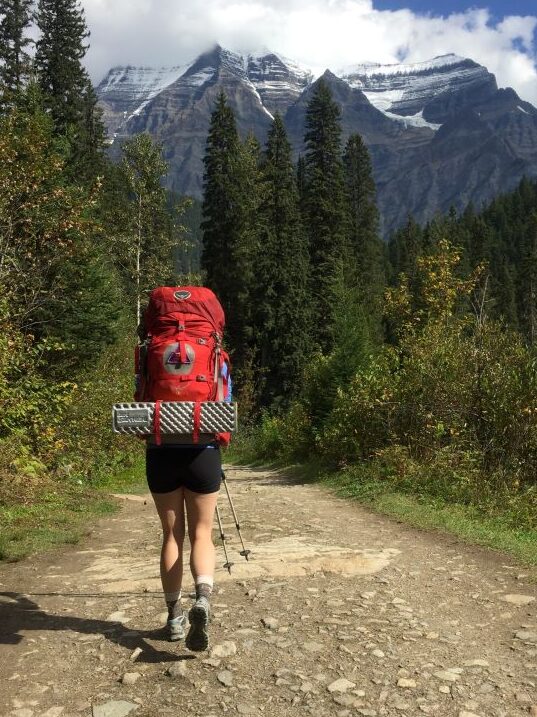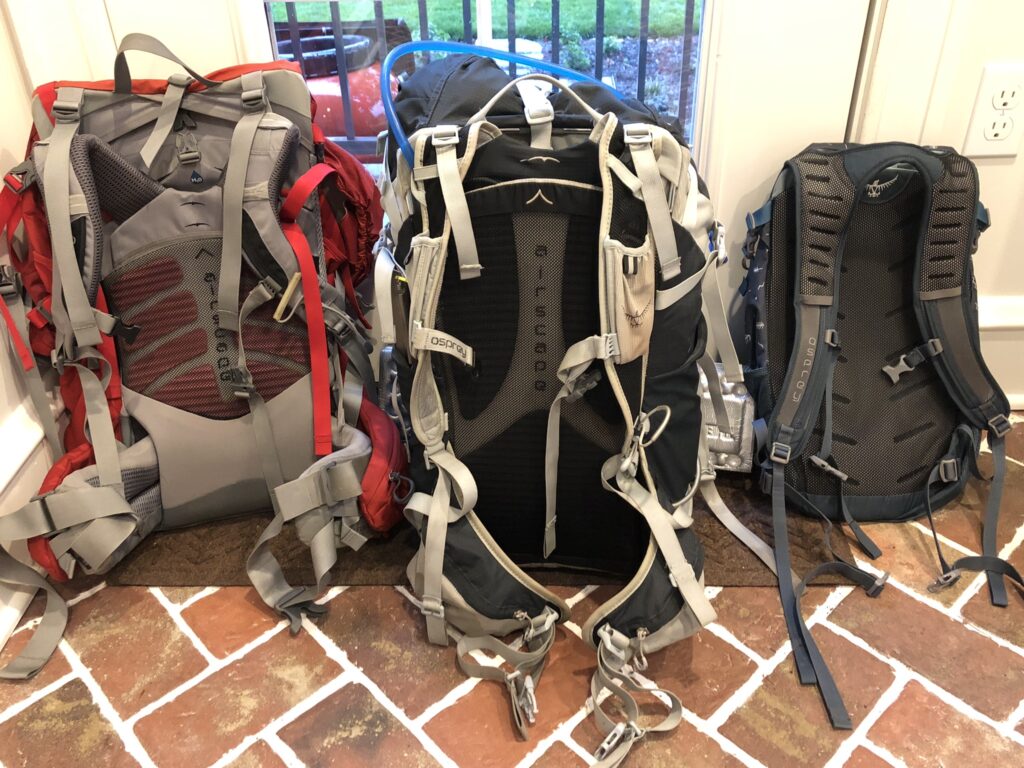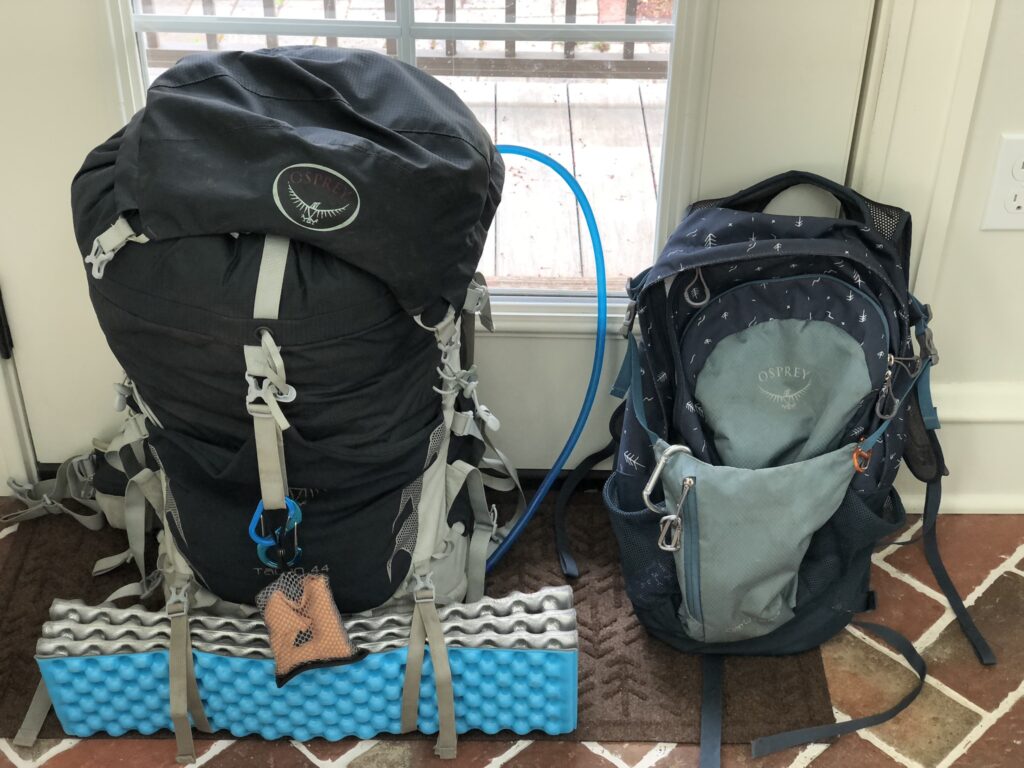What is the difference between backpacking and hiking?

Backpacking and hiking are two excellent outdoor activities to explore nature. If I had to make a list of my favorite hobbies, they would claim the #1 and #2 spot. For me, they aren’t just hobbies; they’re a way of living. I get in touch with the real me when I’m out in the woods.
Both activities involve wandering in nature on foot, but there are some key differences between the two. Think back to your geometry days in middle school: all squares are rectangles, but not all rectangles are squares. All of backpacking is hiking, but not all hiking is backpacking.
Confused? Let’s define both.
What is hiking?
Hiking is exploring the world on foot. Often you follow a trail or path that has been made through a park or wooded area. The path is typically made of a natural-surface (think dirt, roots, and rocks).
While walking and hiking seem similar, I consider walking to be something done on paved paths or in towns. Certainly there are paved trails through natural areas, but this is my general rule.
When hiking, you plan to walk to your objective and return to civilization at the end of that day. The objective could be a certain distance, time, or destination. This is referred to as “day-hiking.” You carry only what you need (water, snacks, map, etc.) to get to your objective. For some, a day hike might only be a few miles, whereas for others, it might be 20+ miles.
There’s a saying in the hiking community to hike your own hike (HYOH). Whether that’s 5 miles or 30 miles, all of it is hiking. And all of it is worth doing.
What is backpacking?
Backpacking in its simplest form is hiking but carrying everything you need to survive on your back for one night or several. The main difference between hiking and backpacking is where you end up at night. When hiking, you end up back at your car or home at the end of your trip.
You might day hike from an established campsite at a park and return to your campsite each night. Your campsite stores your shelter (tent, RV), food, and necessities. In backpacking, you hike each day to your next destination carrying all that you need to sleep, eat, and live.
You can cover a longer total distance backpacking than you could in one day of hiking by breaking it up. You can travel deeper into a natural area and get farther away from civilization (my favorite part!).
Backpacking, like hiking, is open ended: choose your own adventure. Some people backpack an entire long-distance trail, referred to as “thru-hiking.” Others might only spend one or a few nights out in the wilderness. HYOH. Just get out and do it.
The key difference between backpacking and hiking
The key difference between backpacking and hiking is the use of yourself (and a backpack) to carry all you need for multi-day survival in the outdoors: food, shelter, and water. That lends itself to other more subtle differences in the gear required and trails for backpacking.
Gear Selection
Because you have to carry everything on your back, backpacking gear is often lighter and smaller than the same gear used for hiking or camping.
You wouldn’t want to carry a car camping tent while backpacking. Backpacking tents are made of lighter weight materials and are designed to have a more compact interior. Many tents made for car camping allow you to stand up in them – something unheard of for a backpacking tent.
Packs meant for backpacking are generally designed differently. Day packs are meant for hiking shorter distances and carrying less stuff. They’re smaller and often don’t have the padding in the shoulder straps or hip belt that backpacking packs do (if they have a hip belt at all). Hip belts on backpacking packs allow you to transfer the weight onto your hips and legs instead of your shoulders.


You might only bring a Nalgene or water bottle on your day hike, but you may use a water bladder (or multiple bottles) to carry in enough water you need for your backpacking trip. Often times hiking you might bring a sandwich or some snacks, but many backpackers resort to freeze dried backpacking meals for the weight and convenience. Bucking this rule are the backpacker chefs that cook meals from scratch – I admire their skill.
The same logic follows for sleeping bags and sleeping pads. You might bring a queen sized air mattress car camping and day hiking for you and your significant other or dog to hang out on. Backpacking, you might only have a thin foam pad or air pad that is an inch or two thick.
Some essentials you might carry on both day hikes and backpacking trips could be similar, like a compass, map, headlamp, or water purification method.
Since space and weight are at a premium, it’s up to you and your budget, strength, and comfort level to buy the size gear that works for you.
Trail Selection
Hiking can generally happen wherever there is public green space and a trail. Backpacking trails are distinct because they have overnight camping locations accessible only by foot (no drive up option!).
Some places, like state forests, might allow dispersed camping, where you can camp anywhere as long as you stay an appropriate distance from water, roads, or trails. Other backpacking trails have designated wilderness camping spots that may or may not require reservations to use.
For example, Pennsylvania state forests allow dispersed camping for free without a permit if you are staying in one spot for only one night. In New Jersey, backpacking campsites are in established wilderness campgrounds and require a reservation and a fee.
Pennsylvania State Game Lands do not permit camping overnight, so that makes backpacking a trail through Game Lands difficult. The Mid State trail is an example of this.
Many backpacking trails are loops since it’s easy to park your vehicle in one spot and hike back to it. Other out-and-back trails function the same way, but you retrace your steps.
Why should I hike or backpack?
Numerous health benefits
For me, I never feel more alive than when I’m in the woods. There’s a calm, focused, and even-keeled me that doesn’t exist cramped into civilization. I know I’ve gone too long without spending a night under the stars when I start to feel off-kilter and cranky.
If you think that’s a bit weird, that’s ok (I accept my weirdness!). There are plenty of other reasons to take up these hobbies. Hiking (and walking) are terrific for your health: it can prevent heart disease, stroke, and cancer, among many other ailments. It strengthens your muscles and bones. It’s even been shown to reduce the incidence of arthritis and alleviate pain.
Besides the physical benefits, the mental benefits of disconnecting from civilization and getting out into nature cannot be overstated. If you’re looking to feel calmer, less anxious, and more connected with the world, hiking is for you.
Developing self-confidence
Backpacking also instills a sense of independence and confidence. Maybe it’s hearkening back to our roots as pioneers, or hunter gatherers… There’s something oddly satisfying about stripping all the stuff in your life down to the bare essentials and carrying it with you on your back. You’re in charge of your destiny. You need to rely on your knowledge, skills, and awareness to survive a night (or several) without piped water, grocery stores, electricity, or Netflix. Note – cell service is increasing in remote areas. This is good for emergency situations, but not great for solitude and disconnecting.
Generally having fun
Backpacking is also great for lovers of Type II fun. What’s that, you ask? Type II fun feels hard in the moment, but the sense of accomplishment and elation you get when you complete your goal makes it all worth it. Challenge yourself to completing a trail distance in a set time. For example, traveling the 30-mile length of the Pennsylvania Grand Canyon in a weekend or backpacking the entire length of the Appalachian Trail in Maryland.
If you say Type II fun is for the birds, no worries. Backpacking trips don’t have to be marathons, they can be a short hike away from the car to a wilderness campsite. Or if that doesn’t interest you, steal away to a local green space and explore at your leisure. Relax and enjoy the break from constant notifications and social media.
Whatever reason might speak to you, I highly recommend trying out hiking and backpacking. It’ll change your life for the better.
Where should I go?
For hiking, the options are almost endless. You could hike to see a beautiful vista, flowing waterfall, or peaceful lake. Nature is constantly growing and changing through the seasons. You can weave through fragrant blooms of mountain laurel in June, see the colors change in October, and hear the stillness of snow-blanketed woods in winter. Each hike is a celebration of the dynamic world around us.
It’s up to you to decide what you want to see. Research your local, state, and national parks to find what piques your interest. The Alltrails app has tons of options based on your location.
If you want to try backpacking, you can find beginner and intermediate trails in many parks across the country on Alltrails. We also have guides on this site for specific trails (coming soon!).
Get out there with The Nature Nut Project
Check out our how-to articles to get you started on your hiking or backpacking journey.
You’ll also find resources for trip planning and trail guides for beginner and intermediate hikers.
I’ll see you out on the trails.
Do you prefer hiking or backpacking? Are you afraid to try either one? Let me know in the comments!
